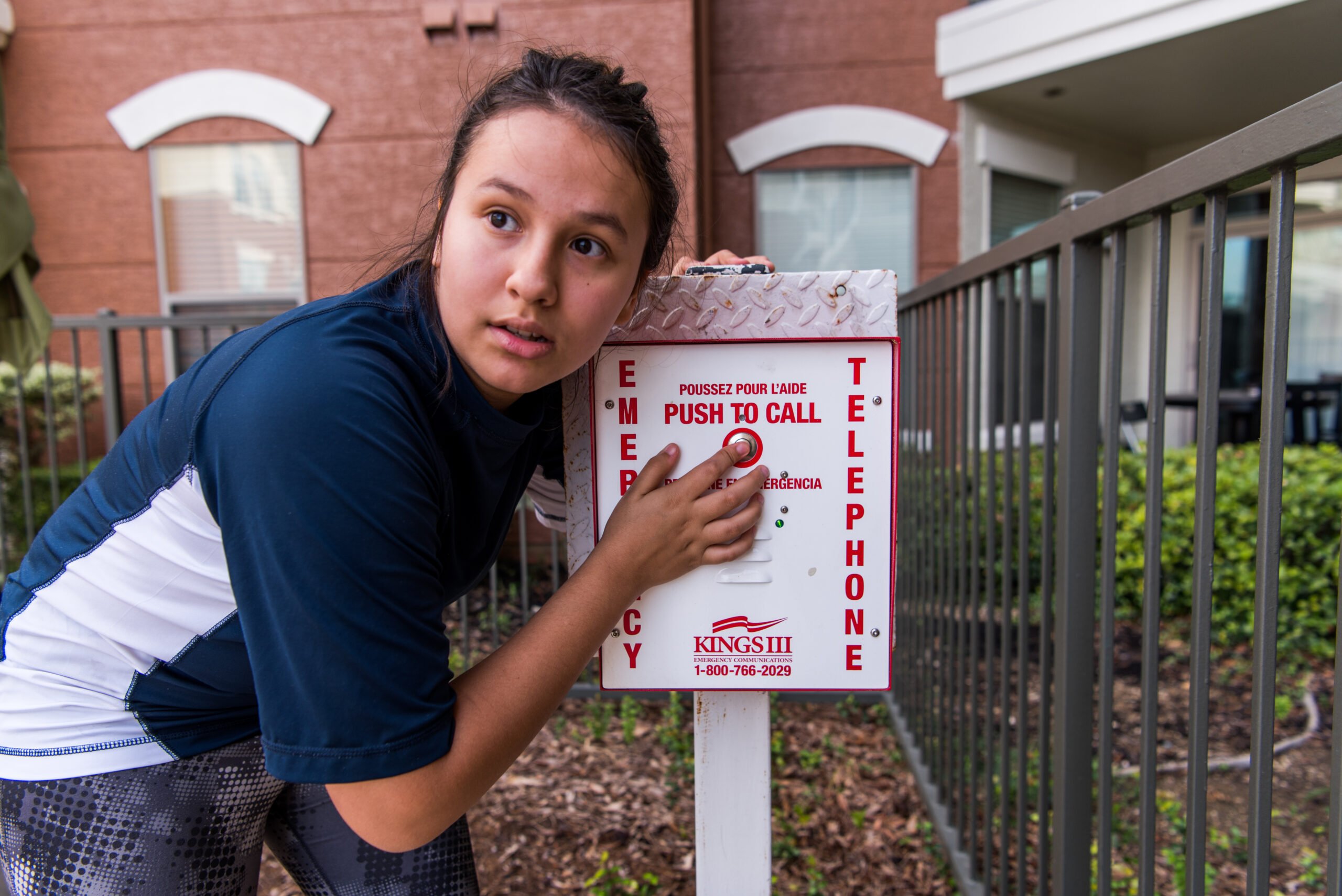BLOG CATEGORIES
Dealing With Burglary as a Property Manager

When it comes to preventing and reporting burglary on your property, your ultimate goal as a property manager — after protecting property and, more importantly, keeping your tenants safe — is to show that you’ve taken measures to prevent the crime in the first place. Even though burglary is universally understood, the actual legal description and the laws surrounding it are a bit more complicated. We’ll try to unravel it here, along with some ways you can prevent and report burglaries that could happen on your property.
Find out how to improve safety and reduce costs at your property
Our best-in-class emergency phone + monitoring solutions provide peace of mind and are backed by decades of expertise
Learn More
2022 ELLIES WINNER
Best Supplier -
Communication System
What is the legal definition of burglary?
The common-law meaning is “trespassory breaking and entering of a structure of another with an intent to commit a felony therein.” The definition comes from state law; the components of the crime may differ from state to state.
As you can see from the definition, burglary is contingent upon accessibility. While tenants can play a role in accessibility to areas such as their units or their cars while on-site, you, as the property manager, hold responsibility for the overall accessibility of the area you manage.
What type of crime is burglary?
In the U.S burglary is usually prosecuted as a felony or misdemeanor. It involves trespassing or theft. If nothing is stolen during a burglary, it is prosecuted as an act of statutory offense.
FREE DOWNLOAD: Building Your Emergency Action Plan >>
Is burglary prosecuted the same way in every state?
No. Like most legal definitions, burglary’s definition may not mean the same thing in every U.S. jurisdiction. State criminal codes are considered along with federal and territorial codes.
When is a property owner found negligent as a result of a burglary?
Being accused of negligent security could mean that, as a property manager or owner, you did not take proper steps and/or install security measures that may have prevented the crime. This is generally referred to as a premises liability lawsuit. Your most-likely defense: creating and maintaining a safe environment.
Who pays for the tenants’ stolen property?
This very question is why tenant renters’ insurance is so important. It should be required by every property manager that tenants must carry this type of coverage. In fact, your lease agreement should specify this requirement, including who is liable if a break-in occurs.
Many states make it clear that property owners, not tenants, may be liable for break-ins if certain due care was not performed. This could include common area maintenance or lock upgrades, among other things (check your local state laws). If a tenant reports a faulty window, door, or lock and the property manager does not take action, this could be a liability for the property manager.
How can you advise tenants to search for stolen property as a result of a burglary?
In many (but not all) cases, property is stolen with the intent to pawn or sell for cash. Fortunately, many states require identification when making a transaction at a pawnshop. If accompanied by a police report and proven to be yours, pawnshops will often return your stolen goods.
Craigslist-type online classified ads may show stolen items being sold. Don’t contact the seller directly; contact the police. They can investigate and hopefully get your stolen items returned.
Can a tenant get out of a lease if they feel unsafe?
In most cases, no. A property manager’s best bet is to show that they are making efforts to upgrade security and security measures.
Read our blog post giving more details on how to combat crime on your property.
What if a tenant is hurt during a break-in?
Property owners are not always automatically liable for tenant injuries. Usually, a court or judge will decide if the owner’s actions (or inactions) may be the cause. Showing that you have taken every proactive step to decrease crime and injury on your property may help your case.
What are the best ways to prevent a burglary from taking place?
- Perform background checks on staff, contractors, and tenants. This is especially important if they are handling money, accessing the property, or working with sensitive information.
- Educate your tenants to be proactive in preventing opportunities for burglars: keep windows and doors locked, keep an eye out for suspicious visitors, organize a “neighborhood watch”.
- Know where all keys are. Keep track of any keys issued to staff, especially if they were to leave your organization. Limit the number of staff who may have access to sensitive areas. Use key fobs that can be programmed as to who can enter where.
- Evaluate your exterior. Keep your area well lit at night. Make sure the property is swept, clean, and well maintained: this sends a signal that you care about your property and what happens to it.
- Hire a security guard or security company (but be aware that this is not a “catch-all” step). Read our blog post on what to consider when taking this step.
- Install video cameras. Even non-functioning cameras tend to be a deterrent to crime.
- Install an emergency communications system.
What is a good crime deterrent that also serves as a lifesaver?
When it comes to burglary incidents, the biggest difference-maker on your property may be an emergency help phone. Kings III makes and monitors a system equipped with two-way voice communication. In some cases, responses to criminal activity can even save lives.
Every Kings III emergency phone system contains:
- A call button
- Phone hardware that does not allow the caller (or potential assailant) to disconnect the call. The phone functions so that the call can only be disconnected by the emergency operator.
- A light indicating the phone has been connected to an emergency operator
- Capability for hands-free use and ADA compliance.
- Call recording, which could help in court if litigation arises from the incident.
Why would a Kings III Emergency Communications system be more effective than a smartphone?
Installing a system like this in targeted areas on your property (entrances, elevators, parking lots, stairwells, common areas) could help combat crime. Here’s why:
- Emergency communications systems let you contact authorities faster and more directly
- Less risk of bad reception or a dropped call
- More precise location identification with automatic number/location identification that pinpoints specific addresses, as opposed to cell phones which can only locate the closest cell towers and triangulate an approximate location
- Professional medical help can be provided over the phone until medics arrive on the scene
- With operators that are trained in handling all sorts of emergencies that will stay on the line until help arrives, an emergency phonehelps alleviate panic and, most importantly, save lives
- More universal help, with response offered in 175+ languages
- Liability reduction: with all calls digitally recorded, date/time stamped, and permanently stored automatically, helping with event verification, reporting, and potential litigation
Be sure to advise your tenants as to where the emergency phones are located, perhaps by regularly announcing it in the property newsletter, social media and email correspondence, or in the lobby.
To learn more about how Kings III can help promote a focus on improved safety on your property, talk to one of our experts.
CATEGORIES TAGGED
CATEGORIES
KEEP LEARNING

Kings III Acquires LiftNet, Advancing Connected Safety & Remote Monitoring in Elevators and Escalators
Kings III Emergency Communications partners with Wurtec to enhance elevator video messaging systems, addressing new code requirements for two-way displays and video monitoring. The collaboration combines Kings III's emergency response expertise with Wurtec's industry solutions to provide streamlined, compliant elevator safety communications nationwide.

Is Your Pool’s Emergency Phone Compliant? Here’s How to Check (And What to Do If It Isn’t)
Is your pool’s emergency phone truly compliant and ready when it matters most? A reliable, code-compliant emergency phone is more than a regulatory requirement—it’s a critical lifeline that ensures immediate access to help during emergencies. This guide walks you through how to check compliance, properly test your phone, and take the right steps if it doesn’t meet current standards. Whether you're ensuring your current system is up to code or exploring a more dependable solution, we’ll help you navigate the process and safeguard both safety and liability.

8 Women Who Shaped the Future of Emergency Response & Dispatch
This Women’s History Month, Kings III is honoring the women who have paved the way in emergency response and dispatch. From breaking barriers in EMS to pioneering advancements in emergency communication, these trailblazers have helped shape the way lifesaving services operate today. See eight influential women whose contributions continue to impact the field and inspire future generations.

Honoring Black Pioneers: 7 Influential Figures in Emergency Communications & Response
This Black History Month, Kings III is honoring Black men and women who served as pioneers in the fields of emergency dispatch and emergency response. See 7 influential trailblazers who broke barriers, advanced life-saving technologies, and shaped the way emergency services operate today.

How Recent Spikes in Copper Theft Threaten Your Emergency Communication & What You Can Do About It
Rising copper theft is putting emergency communication systems at risk, leading to potential service outages. Without a reliable backup, property managers may face compliance issues and safety concerns. Learn more about the threat and how a cellular solution can help protect your property.

Is Your Hotel’s Emergency Communication System Up to Code?
Hotel emergency communication systems must meet strict safety and compliance standards, but are yours up to code? From elevator phones to pool and parking lot emergency call systems, we break down key requirements and how to ensure your property stays compliant.

Kings III & Wurtec Partner to Improve the Emergency Communication Market of Elevator Video Messaging Systems
Kings III Emergency Communications partners with Wurtec to enhance elevator video messaging systems, addressing new code requirements for two-way displays and video monitoring. The collaboration combines Kings III's emergency response expertise with Wurtec's industry solutions to provide streamlined, compliant elevator safety communications nationwide.

Updated Elevator Code: Who are my Authorized Personnel?
Confused about who qualifies as "authorized personnel" under the new ASME 17.1 elevator code? Learn why the same authorized staff must monitor all emergency communications—audio, video, and messaging—and why split monitoring solutions won't meet compliance requirements for your building's safety system.

What an Emergency Dispatcher will Most Likely Ask You
When suddenly faced with an emergency, you may immediately feel frightened and helpless. An emergency communications system can help reduce or eliminate those reactions by providing immediate assistance. Here's what you can expect on the other side of a call you place from an emergency phone.





